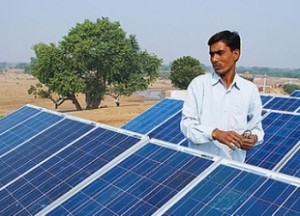Pure Play EV Taxi Operator Plans Major Expansion In India
July 28, 2017Will other US Cities Follow California in Making Solar Energy Compulsory?
August 1, 2017Indian Solar Prices may rise as the government impose duties on Imports
The Indian government has initiated anti dumping duty investigation on imports of solar cells and panels from Malaysia, Taiwan, and China. This was done after a petition was filed by Indian solar manufacturers seeking relief from super low priced module imports from China. Note this is not a new thing as the Indian market always received very low priced imports from China. It was also a major reason why prices of Indian solar energy has dropped in such a precipitous manner over the last few years. From the days of more than INR 12/kWh in 2010, the price of solar energy has dropped by more than 80% to a low of INR 2.44/kWh in the last tender.
However, the booming solar market in India has failed to cheer the Indian makers of solar modules. There are more than a 100 small producers of solar panels in India. Though most are small and uncompetitive, there are a few large producers such as Vikram Solar, Waaree Energies Ltd, Tata Power Solar and the Adani Group. However, even these companies with a large scale and decent technology are non-competitive with Chinese imports. These companies have survived in the last 2-3 years through the domestic content requirement (DCR) policy by which the Indian government reserved a portion of the state sponsored tenders for domestic made solar cells and panels.
Also, read Can Indian Solar Panel Companies Take Advantage of the Solar Boom in India?
However, with India losing the case to WTO, this policy will have to end by December 2017 leaving the Indian solar producers with no way to survive. Solar imports into India increased to nearly $3 billion last year which was a massive surge. With almost 90% of India’s solar demand being dependent on imports, it is certainly not a happy situation for the Indian government which wanted to make solar manufacturing a central tenet of its Indian solar policy.
It is to be remembered that DGAD (Directorate General of Anti-dumping Duties, India) had suggested high import duties on imports but had been stopped by the Indian government as they wanted to lower solar power prices, which was high at that point of time. With solar power prices now becoming cheaper than coal, the Indian government may not want to stop the DGAD from imposing high duties to protect domestic manufacturing which faces obliteration in a business as usual scenario.
It won’t be a happy situation for the Indian solar developers which have been making hay with solar equipment prices constantly declining allowing them to make bumper profits. With prices even rising by 5-10%, they will face difficulties as they have bid very aggressively. Some of them may be forced to abandon projects. Indian consumers will not face too much of a hit as solar power is still a very small part of the Indian power consumption.

